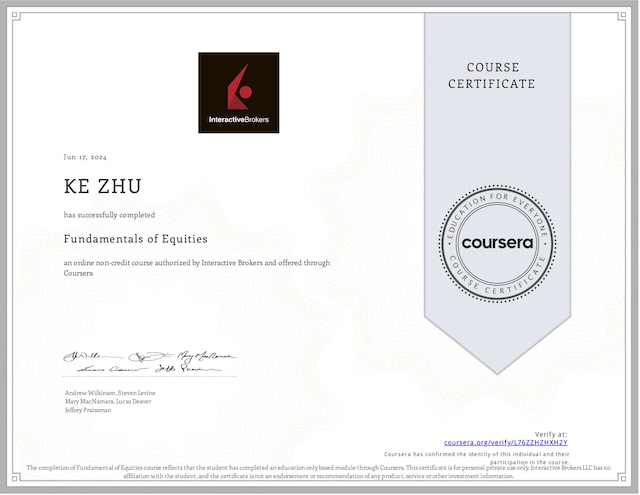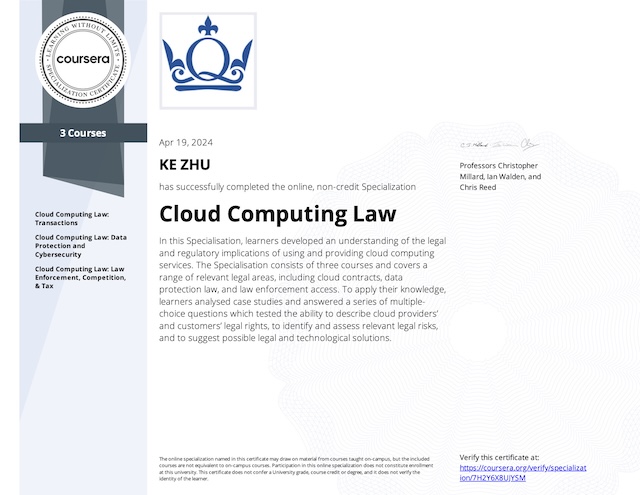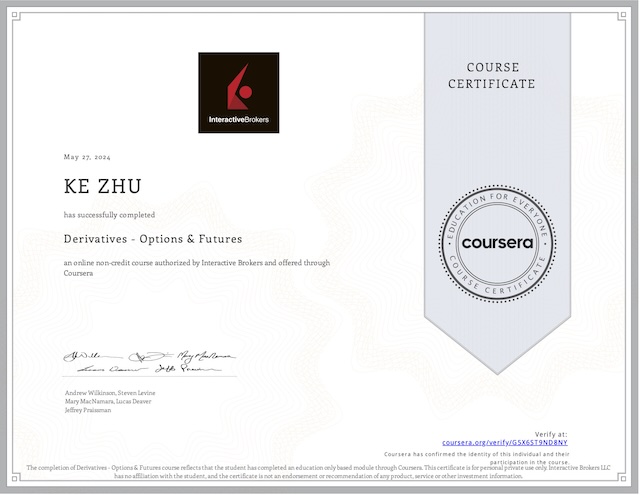Gross Income
Gross income is all income from whatever source defined, it includes income realized in any form whether in money, property or services. If receive property or services, use Fair Market Value. Taxpayer recognize gross income when:
- They receive an economic benefit
- Increase in net worth (assets minus liabilities)
- Borrowed funds represent a liability, not gross income
- They realize the income, and
- Taxpayer engages in transaction
- Transaction results in measurable change in property rights, and
- Transaction provides wherewithal to pay
- The tax law does not provide for exclusion or deferral.
- Gift is excluded, so it is not counted as income.
Return of Capital Principle
The tax basis (e.g.: asset cost) is excluded when calculating realized and recognized income. We can also subtract transaction costs, say broker fees, etc.
Recovery of Amounts Previously Deducted (Tax Benefit Rule)
If you deducted an expense on your tax return in a prior year, but this year, you received a refund for that expense, that refund is included in the gross income and must be taxed. What this tax benefit rule does is it addresses timing issue related to deductions I took previous years from which I’m reimbursed in the current year.
There are areas for tax planning: the ideal is for the deduction to occur in a high-tax year and the reimbursement to happen in a low-tax year. This is perfectly legal.
Claim of Right (opposite of tax benefit rule)
A taxpayer who reported income received in a prior year, can deduct the amount he or she repaid in a subsequent year.
Income Recovery
When an expense item resulted in a partial tax benefit, any recovery is first considered to be from the benefit received.
Accounting Methods
Generally individual report the income and deductions each calendar year from Jan 1 to Dec 31. The method of accounting generally determines the year in which realized income is recognized. There are 4 accounting methods, and IRS has power to prescribe accounting method:
Cash
Cash (usually used by individuals), property or services received are included in gross income in the year of actual or constructive receipt, regardless of whether income was earned in that year.
Exceptions:
1. An amount is “constructive received” when it is set aside and made available to taxpayer without substantial restrictions.
2. Loan or liability is not income
Accrual
Cash (usually used by business), property or services received are included in gross income when earned, regardless of when collected.
All events have occurred that fix taxpayer’s right to the income, AND the amount can be determined with reasonable accuracy.
Exceptions:
- Prepaid income is often taxed in year of receipt (whether or not earned).
- When taxpayer sells goods and receives prepayments for the goods, the taxpayer can elect to defer recognition of income from advance payments for goods if the method of accounting for the sale is the same for tax and financial reporting purposes.
- When taxpayer sells services, an accrual basis taxpayer can defer recognition of income for advance payments for services to be performed after the end of the tax year of receipt. Does not apply to prepaid rent or prepaid interest.
Special
Special account method is usually for a long-term contract and income is recognized over a long period. It includes farm income, installment sales, and some depreciation methods.
Hybrid
Combination of two or more of the previous methods above.
For example: use accrual method for inventory purchases and sales, and use cash method for non-inventory income and expenses.
Special Inclusion Rules
Alimony
Alimony is defined as a transfer of cash made between two spouses under a written separation agreement or divorce decree. The separation or divorce decree does not designate the payment as non-alimony. (If the decree is silent on the form of payment, then one assumes it is alimony unless the decree specifically designates that payment is not alimony.) The payment do not continue after death of recipient.
For divorces occurring before and in 2018, alimony and separate maintenance payments are deductible by the party making the payment (income decreased), and are included from the gross income of the party receiving the payment (income increased, pay tax).
For divorces occurring after 2018, alimony and separate maintenance payments are nondeductible by the party making the payment (income unchanged, pay tax), and are excluded from the gross income of the party receiving the payment (income unchanged).
Property divisions and child support are not alimony. Upon a divorce, it is important to be clear whether payments are related to property divisions, alimony or child support.
Discharge of indebtedness
When a taxpayer’s debt is forgiven by a lender, the taxpayer must usually include the amount of debt relief in gross income. Exceptions exist for certain types of loans if the taxpayer is insolvent or bankrupt. However if the discharge makes the taxpayer solvent, then the taxpayer has to recognize the income to the extent of solvency.
Income portion of annuities
A portion of each payment is treated as non-taxable return of capital (return of basis) and the remainder as gross income.
Expected Total Return of Annuity
= Annual Amount Paid to Annuitant * Number of Years
Exclusion Ratio = Investment / Expected Total Return of Annuity
Exclusion Amount = Exclusion Ratio * Annuity Payment ReceivedThere is also a simplified method required for annuity distributions from qualified retirement plans:
Exclusion Amount = Investment / Number of anticipated monthly paymentsPrizes and Awards
Usually prizes and awards must be included in gross income, and not included:
- if it is made for scientific, literary or charitable achievement and transferred to a qualified charity.
- if it is noncash awards for employee safety and length of services ($400 limit).
Group Term Life Insurance
Exclude premiums paid by employer on first $50000 of coverage. Premiums on excess coverage are included in gross income. if a plan discriminates in favor of key employees, key employees are not eligible for exclusion. The key employees must include in the gross income the greater of:
- Actual premiums paid by employer, or
- Amount calculated from the Uniform Premiums table of IRS.
Unemployment Compensation
Unemployment compensation is includible in gross income in full.
Social Security Benefits
Social security benefits arose because of a tax paid in the first place, but then when they are paid our to you, they are taxed. The lower income individuals can exclude 100% of social security benefits from gross income. High-income individuals exclude only a portion of their benefits from gross income (up to a maximum of 85% are taxed). Taxpayers who are neither high nor low income include up to 50% of total benefits in gross income.
Exclusions
Municipal Bond Interest Income
Interest earned on state, county, municipal or other local bonds is excluded from (federal) gross income. Any expenses incurred in earning that interest are not deductible. The exclusion does not apply to any gain on sale of the tax-exempt bonds. Interest on most U.S. government bonds, foreign government bonds, and corporate bonds, bank account are not excluded from gross income.
Gifts and Inheritances
Congress allows the recipient of a gift or inheritance to exclude the value of the property from gross income. Gifts are voluntary transfer of property by one to another without adequate consideration or compensation. It must be made “out of affection, respect, admiration, charity or like impulses”.
Life Insurance Proceeds
The income received by a beneficiary upon the death of a person with life insurance will be excludible from the beneficiary’s income. If owner cancels policy and receives cash surrender value, gain must be recognized to the extent the amount received exceeds the premiums paid on policy. No losses are recognized.
Exception: If the owner of the policy is terminally ill, any gain on cash surrender or transfer of policy to third party is excluded from gross income. If owner is chronically ill, also no gains on the proceeds, they are excluded from gross income but only these proceeds are used for the long-term care of the insured.
Scholarship, Payments for Damages, Compensation for Injuries and Sickness
Scholarships and fellowships entail amounts paid to or for the benefits of a student to aid in pursing a degree at an educational institution. Scholarship is non-taxable to the extent of scholarship pays for tuition and related expenses for courses. However amounts received for room and board are included in gross income. Exclusion applies only if recipient is NOT required to perform services in exchange for receiving the scholarship. Tuition waivers or reductions are excluded.
Payment for Damages
Tax consequences of the receipt of damages payment depends on type of harm experienced by taxpayer:
| Loss of income (breach of contract) | Generally taxed the same as income replaced |
| Expenses incurred | Not income, unless expenses previously deducted. Previously deducted expenses are taxable under tax benefit rule. |
| Property destroyed | Treated as an amount received in exchange / sale of property Taxpayer has realized gain if damage payments exceeds basis. |
| Personal injury | Compensatory damages excluded if received for or result of physical personal injury or physical sickness. Emotional stress damages are not excluded, unless paid for medical care attributable to emotional distress. Punitive damages are always included in gross income. |
Compensation for Injury and Sickness
For worker’s compensation: Although it is a payment for loss of wages, worker’s compensation is excluded from gross income because the payments stem from a physical injury.
For accident and health insurance benefits:
- If the benefits received under the health insurance policy were purchased by the taxpayer, then any amount received is excluded from the recipient’s gross income even if the benefits substitute for income.
- Employer-sponsored accident / health plans: if employee receives payments to reimburse for medical costs, these payments are excludable; if employee receives payments as a replacement for lost wages, the payments received are includible.
- Premiums are deductible by employer, but values of premiums is excluded from employee’s income.
- Benefits received will be included in gross income of employee when received, unless they are for medical costs, or for the permanent loss or use of a member or function of the body.
Meals and Lodging
Value of meals and lodging provided to an employee (and the employee’s spouse and dependents) is excluded from gross income if meals and / or lodging are:
- Furnished by the employer
- On the employer’s business promises
- For employer’s convenience
- The employee is also required to accept the lodging as a condition of employment (for lodging only)
Recovery of Capital Issues
| Dividends | Dividends are usually includible in shareholder’s gross income to the extent that the corporate has current or accumulated corporate earnings & profits. |
| Recovery of capital | If the distribution from the corporation to shareholders exceeds the corporation’s E&P, then it is treated as recovery of capital, and thus is non-taxable. It is excluded to the extent of shareholder’s basis in the stock. |
| Capital gains | Once the shareholder’s basis for stock is reduced to zero, any subsequent distribution are again includible in gross income, but now as capital gains, rather than dividends. |
Pro rata stock dividends / splits do not result in gross income. However if shareholder has option of receiving cash or stock, the shareholder will recognize income regardless of what is chosen.
Employee Fringe Benefits
The value of these fringe benefits is included in employee’s gross income as compensation for services. But value of “qualifying fringe benefits” are specifically excluded or partially excluded from gross income.
Qualifying fringe benefits that do not allow discrimination (must be offered to all employees equally to remain excludible):
- Dependent care
- Athletic facilities
- Educational assistance
- Adoption expenses
- Cafeteria / flexible benefits plans
- No additional cost services
- Qualified employee discounts
Some qualifying fringe benefits do allow discrimination (can be offered to some employees and not others; employees receiving fringe benefits can still exclude value of benefits from gross income):
- Working condition fringe
- De minimus fringe
- Qualified transportation
- Qualified retirement planning services
My Certificate
For more on Gross Income for Individuals, please refer to the wonderful course here https://www.coursera.org/learn/federal-taxation-individuals
Related Quick Recap
I am Kesler Zhu, thank you for visiting my website. Check out more course reviews at https://KZHU.ai



